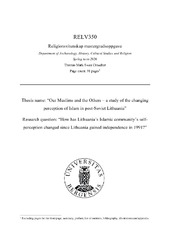Our Muslims and the Others – a study of the changing perception of Islam in post-Soviet Lithuania.
Master thesis
Permanent lenke
https://hdl.handle.net/1956/23077Utgivelsesdato
2020-06-27Metadata
Vis full innførselSamlinger
- Master theses [240]
Sammendrag
In Europe, Islam is a polarizing theme amongst non-Muslims, usually in the context of immigration in recent decades. However, Muslim minority groups, with deep historical roots in the Christian parts of the continent, have largely avoided the discourse. The opinions of these minority groups, and how they feel affected are questions that have inspired me to focus on the self-image of the Lithuanian Muslim minority since the fall of the Soviet Union. The thesis focuses on the minority group "Lipka Tatar", an ethnic group with Islam as religion. Not only have they been tolerated by the Lithuanian majority, they have actually flourished with central influence in the region's historical development for over 600 years. The group is quite unique in Europe because they have maintained their cultural and religious identity despite having lived under constant Christian influence since immigrating towards the end of the 1300s. In working on this thesis, I used passive observation and informal interviewing as methods to examine how immigration and today's discourse on Islam in Europe have affected the self-image of Lithuanian Muslims. As the most central method, my informal interviews, with both Tatar and non-Tatar Muslims, revealed interesting and partly surprising developments. The research produced three primary findings: First, Lithuania, similar to the rest of Europe, is to varying degrees concerned about the consequences of "unrestrained" immigration of new Muslims. Secondly, Tatars still enjoy a special position among the average Lithuanians, as they are seen as "our Muslims" who have earned their citizenship. The third, most interesting, finding, was the strained relationship that has developed between Tatar and non-Tatar Muslims. While the Tatars fear their final eradication of "traditional Muslims", non-Tatars believe that they are only providing a helping hand so that Tatars can return to the correct expression of Islamic faith. The topic is not new in Lithuanian, Polish and Russian research, but hopefully this thesis will help elucidate a topic in religious science that has so far had a limited focus in Norwegian and English literature.
